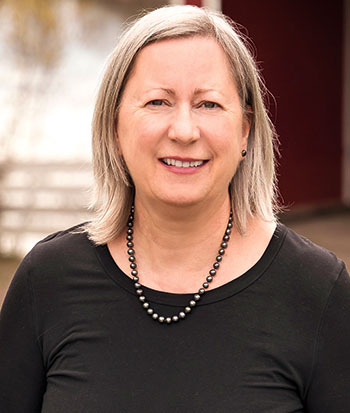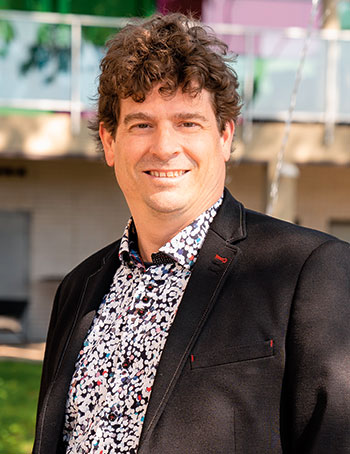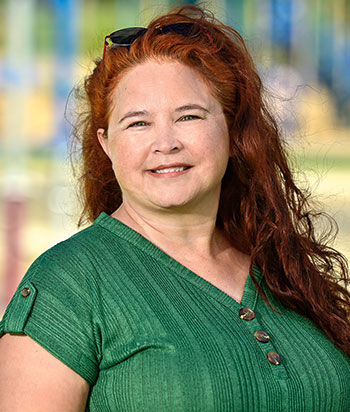For the kids

“Speaking up for our children.” That, in a nutshell, is what drives Diane Bélanger’s unionism. And always has. A psychoeducator for some 35 years, she decided to step up as deputy delegate the day funds allocated to her and her colleagues in a Causapscal school in the lower St. Lawrence region—where she had been working for 15 years—were cut. “I couldn’t believe they were cutting back on services. I was barely meeting the kids’ needs, despite working full time.”
Her union involvement now spans some 20 years, including 10 years as President of the Syndicat des professionnelles et professionnels de l’éducation du Bas-St-Laurent. “I soon realized the hardships experienced by some of my colleagues, due in part to school board mergers and what we saw as increasingly dehumanized management practices.” This role was tailor-made for one who describes herself as “not afraid to speak her mind when dealing with employer representatives.”
Her involvement also helped break the isolation some education professionals experience, each in their own schools. “By getting involved in CSQ decision-making bodies, I realized that the Centrale could impact political decisions like school board mergers. Because the more of us there are, the more we can move things forward. I also discovered people from various walks of life with many common interests who aspired to change the world.” A wonderfully rich networking opportunity.
Getting involved is, quite simply, crucial for Diane Bélanger. It helps make sure that children have access to the services they truly need. “We were successful, through negotiation and by intervening with political officials, in promoting professional services in public education. Today, you can find more than one professional per school instead of one resource person for several school institutions. That certainly was not the case when I first got involved.”
Despite these small victories, there is still much to do: instead of hiring more professionals, we see parents being encouraged to turn to the private sector when waiting lists get longer. And there lies the importance of staying involved to keep up the pressure on our governments.
Know and assert your rights

The “Aha moment” happened for Alain Sauvageau when an Occupational Health and Safety position opened up at his Cegep’s local union. While he admits that he initially resisted anything union-related, he still read the entire collective agreement when he was first hired. “My mother always told me to read all my contracts. I followed her advice and, for a whole month, it was my bedtime reading,” explains the Cegep de Granby Chemistry Laboratory Work Technician.
Alain Sauvageau had such a good handle on the subject that the union actively courted him in the hope he would get involved, though he turned then down several times. “I finally agreed to become the Occupational Health and Safety Advisor because I believed I could really help my colleagues avoid occupational diseases or serious injuries. I knew that I would be useful.” Through his union role, he could hold employers to account and insist they prevent potential dangers.
This first incursion convinced him that unions weren’t a “pain in the neck,” but decision-making bodies that changed workers’ lives for the better. Twenty years on, he is still actively involved as advisor and Secretary for the Syndicat du personnel de soutien du Cégep de Granby – Haute-Yamaska. “It really sparked something deep inside me: I’ve been Mobilization Director, Vice President and President. I even served one term at the Fédération du personnel de soutien de l’enseignement supérieur.”
Alain Sauvageau really enjoyed being involved with the collective agreement negotiations. It helped him make sense of the arguments on all sides and to better understand the various clauses. “I remember this one time, a colleague came to see me to tell me she was pregnant. We went to the boss’s office, where I said that she couldn’t work in the laboratory anymore and that we had to find something else for her to do.”
It’s actually members’ gratitude that encourages this advisor to remain involved in his local union. “It’s our members’ appreciation that energizes me. When they ask for advice, or thank me for my help, for answering their questions, for helping them. That’s what pushes us to keep on fighting, so that everyone can have decent and fair working conditions.”
Alain Sauvageau believes that there is still much to do to see the support staff properly recognized. “People often say that public service workers have it really good. And yet, our salary remains below the average wage of Québec earners and below Canadian salaries.”
Being involved in his union remains, quite simply, as crucial in 2022 as when he first stepped up in 2003. “Once you call it quits, there isn’t anyone left to protect what we’ve achieved in the past fifty years, like pay equity.”
Fully involved, naturally

Being involved in a union body is a great opportunity to take a very broad look at our society, believes early childhood educator Claudia Lupien who first got involved in her union in the early 2000s. Currently Executive Committee Secretary-Treasurer at the Syndicat des intervenantes en petite enfance de Montréal, she has held most of the organization’s positions and participated in various committees.
Unionism goes far beyond working conditions, regardless of their importance. “We can also impact society as a whole by fostering certain values or even supporting causes which have bearing not only on unionized employees, like raising the minimum wage. I believe that advocating for social justice is a good thing.” She adds that it is also an opportunity to connect with people who share the same values. All the more so given that it is the sum of everyone’s talents that truly makes a difference. "A labour union is the sum of all its parts, of all its members. Every single raised fist matters.”
She goes on to say that “any progress we experience in life is directly related to activism. I believe that everybody should embrace and advocate for at least one cause. Personally, I support several issues. I participate in marches or share information on different topics related to feminism, human rights or LGBTQ+ (lesbian, gay, bisexual, transgender, queer and others) issues, all causes I believe in.”
Getting involved in her union was only natural for Claudia Lupien. “Either we feel compelled and our involvement is natural or our inner critic demands that we change the way things are. In my case, it was a bit of both. I also wanted to add my own two cents, to share my ideas, my strengths. And it’s extremely rewarding to participate, to see how things work from the inside even though there is a great deal of transparency, to be a part of this extraordinary machine.”
She also feels that, with her unionism, she is doing her part for her community. “These decision-making bodies are essential to better working conditions, but they’re also very rewarding. I am very proud of the work we do and appreciate the opportunity to take on personal challenges. For instance, you can learn new things, like how to speak in public. Even if, one day, I decided to step away from unionism, this sense of belonging will always stay within me,” she summarizes.
